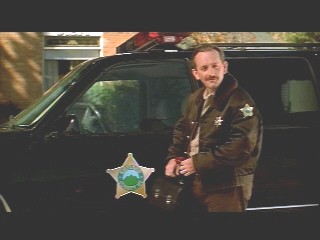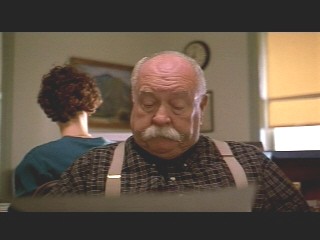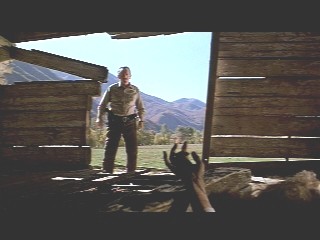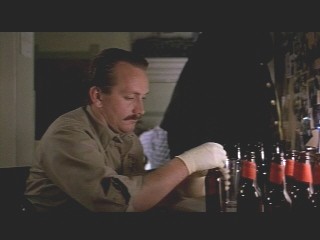
|
|
|
|
|
|
|
|
|
|
|
|
|
(2001) Director: Richard
Dutcher When you hear the term "Christian movie", what immediately goes through your head? Even if there are regular churchgoers among the regular readership of this web site, I think it's safe to say that what goes through our heads is decidedly negative. Oh, sure, there is the infamous If Footmen Tire You... What Will Horses Do?, which was filled with an incredible number of unintended laughs, like I'm sure a few other Christian movies have done in the past. But those particular Christian movies are only fun to watch because they are bad in a particularly twisted way, not because of anything genuinely good about them. When you think about other Christian movies, you'd be hard-pressed to think about anything genuinely positive to say about them. Poor production values seems to be a constant factor, no doubt due both to the low budgets and the limited filmmaking experience of the people behind the camera. As for the people in front of the camera, their performances tend to just as experienced and polished as the members of their fellowship behind the camera. Though what really ultimately sinks these Christian movies is that their screenplays tend to be unengaging, written seemingly from graduates from the Jack Chick School of Screenwriting. That is, things happening in the stories and with the characters that are so hokey and contrived that you refuse to get emotionally involved, and dead halts to the narrative to preach the Word for minutes on end that only get you to the Creator by boring you to death. This kind of thing happened for a long time, in part
because the idea of making these movies less preachy seemed blasphemous
to many That's not to say that these movies happen to be good. Having only seen two of these new-breed Christian movies to date, I can't confirm this, but reports generally claim that the majority of these movies are still pretty wretched. I saw evidence of this for myself when I watched Meggido: The Omega Code 2, which I sought out mainly because I heard Franco Nero (Compaņeros) was in the cast; as it turned out, he was the only decent element in an otherwise humdrum apocalyptic tale punctured only by the occasional unintended laugh. Still, these movies seem to be no worse than much of the non-Christian dreck in video stores, and the intended-entertainment nature of these movies has resulted in them being more available in video stores, which of course means more people are seeing them. It's a start, and maybe with time the general quality of these movies will increase. Proof of this possibility can be seen in Brigham City, the other new-breed Christian movie I've watched. It is extremely well-crafted in two areas; not only does it have a story that keeps you interested, but it has a religious angle that interests and educates you without ever coming across as preachy or as "homework". Most Christian films deal with the aspects of the faith
in a fairly broad way, probably One thing viewers of Brigham City may not be expecting is how it chooses to portray both Mormons and those individuals who do not follow the faith. Though there is a passing mention of how the community has, in a way, made itself separate from the outside world (and its various troubles), the various outsiders that appear are not portrayed in a real negative way. The imported housebuilders working at the edge of town are shown to drink beer and get into the occasional fist-fight, but Wes' investigation of them digs up nothing really negative about them - even their Mormon foreman speaks well of them. The FBI agent (Tayva Patch, Little Secrets) who comes in to lend a hand to the investigation is a woman who is proud of her background (she speaks fondly of her Manhattan upbringing), yet respectful and uncritical of the Mormons - and leaves on an equally good note at the end of the movie without becoming a Mormon convert. While she admits to Wes she can't understand their preference to stay out of the outside world, she also admits maybe she's a little naive. Wes, for that matter, admits that maybe their relative isolation has left them naive to a different degree. Certainly, while being Mormon has given them things like a strong sense of community and brotherly love, things are not perfect besides the fact one of them seems to be a killer. They are shown to sin (one secretly engaged in a hobby frowned upon by Utah and a few other states), and the movie even admits that God won't always answer their prayers, even in desperate situations. Wes himself is not in an ideal situation, even before he
finds the first body. He has to use a metal brace on one leg because of
a past car Dutcher didn't write a mystery that presents clues (at least of real substance) that offer the viewer to chance to solve the mystery before it actually happens onscreen, a la movies like The Last Of Shelia. Instead, he uses a number of different techniques to maintain a tense and uneasy feeling that keeps you alert and wondering what will happen next. The bodies are discovered without sensationalism; everything from the camera movements to the music is greatly subdued, with only a limited (and tasteful) look at each scene. Instead, we're made to look at the silent and sickened faces of the investigators and onlookers; it hits home with surprising force. I think a big part of the movie's great feeling of unease also comes from how Dutcher maintains a feeling of isolation and unpreparedness, even in the lighter moments. It's a place far from any big city, with only one sheriff and a deputy. The hills surrounding the town are bare. Except for the celebration of the town's birthday, nowhere in the streets can you hear traffic or voices. It's a pretty place, yet you sense something unsettling. Speaking of the visuals, while the photography of the movie isn't quite ready for theaters (the look of the movie more resembles that of a television drama) Dutcher at least deserves praise for getting it to look that good when you realize he had less than a million dollars to spend on the actual production. In other scenes, Dutcher puts a spin on something
familiar, like the scene when Wes finds As for that religious angle... I would say that it actually enriches the movie. The only instance when it could be considered distracting is the scene where the F.B.I. agent attends services at Wes' chapel for the first time, but only because the sequence goes on for a bit too long. Despite its overlength, the sequence remains interesting because the Bible discussion does bring up some pointed questions (like: Must we lose our innocence to gain wisdom?) that even non-religious people will find interesting to think about. The firm belief these characters share sometimes makes them do things somewhat differently than you'd normally think. One of these moments is when Wes, getting desperate, rounds up a number of the townspeople and asks them to go house to house and search each one thoroughly - without warrants. As it turns out, practically all the residents freely let their neighbors search their houses, because as Wes puts it, "It's the right thing to do." Then there is the final sequence in Wes' chapel, and the religious setting gives the movie a beautiful and emotionally powerful ending without one word needed to be uttered. If in the future they can make them as good as Brigham City, I would really be interested in seeing more religious movies. Also reviewed at: Cold Fusion Video Reviews
Check for availability on Amazon (VHS) See also: Dr. Cook's Garden, Skeletons, ...tick...tick...tick... |
 Christians, and because they always knew they
would get positive reviews for their movies from boneheads like Michael
Medved, no matter how boring or badly-made the product might be. But
just a few years ago, Christian filmmaking started to take a turn in a
different direction. Some of the people in this field realized that (1)
they weren't exactly attracting new converts with these movies, and (2)
many Christians themselves were shunning these movies in favor of
something more entertaining, even if what they chose was undecidedly
unChristian in content. The most logical thing to do was to make their
movies more entertaining than preachy. The ball really started rolling
in this direction with the 1999 release of The Omega Code.
Not only did its cast contain recognizable stars (including Casper Van
Dien and Michael Ironside), the Torah-centered plot centered more
around suspense and action than preaching, and it ended up grossing a
whopping $12 million in just 450 theaters. Its success has inspired
other Christian filmmakers to make movies of a more entertaining
nature, including the sports-related Extreme Days to the
computer animated Jonah: A VeggieTales Movie.
Christians, and because they always knew they
would get positive reviews for their movies from boneheads like Michael
Medved, no matter how boring or badly-made the product might be. But
just a few years ago, Christian filmmaking started to take a turn in a
different direction. Some of the people in this field realized that (1)
they weren't exactly attracting new converts with these movies, and (2)
many Christians themselves were shunning these movies in favor of
something more entertaining, even if what they chose was undecidedly
unChristian in content. The most logical thing to do was to make their
movies more entertaining than preachy. The ball really started rolling
in this direction with the 1999 release of The Omega Code.
Not only did its cast contain recognizable stars (including Casper Van
Dien and Michael Ironside), the Torah-centered plot centered more
around suspense and action than preaching, and it ended up grossing a
whopping $12 million in just 450 theaters. Its success has inspired
other Christian filmmakers to make movies of a more entertaining
nature, including the sports-related Extreme Days to the
computer animated Jonah: A VeggieTales Movie.  so there is less
chance of alienating any viewers from a specific Christian following.
As you may have guessed, this is not the case with Brigham City;
it was made by Mormon filmmakers, and deals with Mormon characters.
However, it's not really about Mormons and the Mormon faith;
it's more about how individuals, who happen to be Mormon, react to a
particular terrifying crisis. Despite the title, the events do not take
place in the actual city of Brigham City in Utah, but a small town
elsewhere in Utah named Brigham. It's a predominantly Mormon town; in
fact, Wes (Dutcher, who also wrote and directed the movie) is not only
the town sheriff, he is also the Bishop for one of the community's
chapels. Up to now, it's been a nice quiet place, where the only
tension comes from the town's grumpy retired sheriff Stu (Brimley, Cocoon),
who is bored and restless now that he can only stay involved in
policing by doing odd jobs in the sheriff's office. The calm and
tranquility is shattered one day when Wes, returning from a routine
call, discovers an abandoned out-of-state car parked in a field... and
a brutally murdered woman nearby. Shocked and upset, Wes immediately
contacts the county authorities and the F.B.I., and is happy to have
them take it out of his hands. Managing to cover up the discovery to
all but a few townspeople, Wes thinks things can now get back to
normal... until the following day, where another discovery informs Wes
and the rest of the townspeople that they have a serial killer in their
midst.
so there is less
chance of alienating any viewers from a specific Christian following.
As you may have guessed, this is not the case with Brigham City;
it was made by Mormon filmmakers, and deals with Mormon characters.
However, it's not really about Mormons and the Mormon faith;
it's more about how individuals, who happen to be Mormon, react to a
particular terrifying crisis. Despite the title, the events do not take
place in the actual city of Brigham City in Utah, but a small town
elsewhere in Utah named Brigham. It's a predominantly Mormon town; in
fact, Wes (Dutcher, who also wrote and directed the movie) is not only
the town sheriff, he is also the Bishop for one of the community's
chapels. Up to now, it's been a nice quiet place, where the only
tension comes from the town's grumpy retired sheriff Stu (Brimley, Cocoon),
who is bored and restless now that he can only stay involved in
policing by doing odd jobs in the sheriff's office. The calm and
tranquility is shattered one day when Wes, returning from a routine
call, discovers an abandoned out-of-state car parked in a field... and
a brutally murdered woman nearby. Shocked and upset, Wes immediately
contacts the county authorities and the F.B.I., and is happy to have
them take it out of his hands. Managing to cover up the discovery to
all but a few townspeople, Wes thinks things can now get back to
normal... until the following day, where another discovery informs Wes
and the rest of the townspeople that they have a serial killer in their
midst. accident, an
accident that also killed his wife and son. Though he stays in close
contact with the people he works with and with his parishioners, it's
clear he's a lonely man. Not only that, but he's weighed down with the
trauma of the past and with of all the responsibilities he currently
has in his two roles - and there's no sign that his faith can lift the
burden, at least by itself. Besides giving the movie an extra edge of
honesty, it keeps the character of Wes humble, and our sympathies stay
with him at all times. There's nothing about Wes that strikes us out of
the ordinary, and that's what makes him more compelling than your
typical Hollywood lawman. While he's a sheriff, he still doesn't find
the investigation process easy, such as when he decides to collect
every beer bottle from the local tavern one night, then dust each one
for prints and scan them with the F.B.I. agent's computer. Not only is
it a taxing task (we see for ourselves how much effort and time is
needed), he knows right from the beginning that they will only get
circumstantial evidence - at best. Performing the character he wrote,
Dutcher is pretty decent. He and the almost entirely amateur cast
are occasionally a bit rough around the edges, but this roughness
actually fits well with these characters, who are more down-to-earth
and less sure of themselves and things than your typical cinematic
protagonists.
accident, an
accident that also killed his wife and son. Though he stays in close
contact with the people he works with and with his parishioners, it's
clear he's a lonely man. Not only that, but he's weighed down with the
trauma of the past and with of all the responsibilities he currently
has in his two roles - and there's no sign that his faith can lift the
burden, at least by itself. Besides giving the movie an extra edge of
honesty, it keeps the character of Wes humble, and our sympathies stay
with him at all times. There's nothing about Wes that strikes us out of
the ordinary, and that's what makes him more compelling than your
typical Hollywood lawman. While he's a sheriff, he still doesn't find
the investigation process easy, such as when he decides to collect
every beer bottle from the local tavern one night, then dust each one
for prints and scan them with the F.B.I. agent's computer. Not only is
it a taxing task (we see for ourselves how much effort and time is
needed), he knows right from the beginning that they will only get
circumstantial evidence - at best. Performing the character he wrote,
Dutcher is pretty decent. He and the almost entirely amateur cast
are occasionally a bit rough around the edges, but this roughness
actually fits well with these characters, who are more down-to-earth
and less sure of themselves and things than your typical cinematic
protagonists. himself having to
tell a couple that their daughter has been murdered; it doesn't go
quite to plan, and the sequence manages to ingeniously underline that
previously mentioned part of Wes that seems to feel helpless. The
climax is a bravura piece of writing and directing. Not only does it
contain some surprising twists, it manages to be horrifying in many
different ways, right down to a certain noise heard right after the
struggle comes to an end. Though as great as that sequence is,
and the generally constant gripping tone, I should mention that over
the course of the 2 hours, there are a few moments that don't work.
Maybe it's only because I've seen so many mystery movies before
Brigham City that I knew that the brash non-Mormon construction
worker was an obvious red herring, or that when the F.B.I. agent gets a
flat tire and one of the town's residents pulls up and slowly goes
through the motions of helping her out, that it would turn out that the
guy just happened to have the quirk of walking slowly when carrying a
tire iron.
himself having to
tell a couple that their daughter has been murdered; it doesn't go
quite to plan, and the sequence manages to ingeniously underline that
previously mentioned part of Wes that seems to feel helpless. The
climax is a bravura piece of writing and directing. Not only does it
contain some surprising twists, it manages to be horrifying in many
different ways, right down to a certain noise heard right after the
struggle comes to an end. Though as great as that sequence is,
and the generally constant gripping tone, I should mention that over
the course of the 2 hours, there are a few moments that don't work.
Maybe it's only because I've seen so many mystery movies before
Brigham City that I knew that the brash non-Mormon construction
worker was an obvious red herring, or that when the F.B.I. agent gets a
flat tire and one of the town's residents pulls up and slowly goes
through the motions of helping her out, that it would turn out that the
guy just happened to have the quirk of walking slowly when carrying a
tire iron.